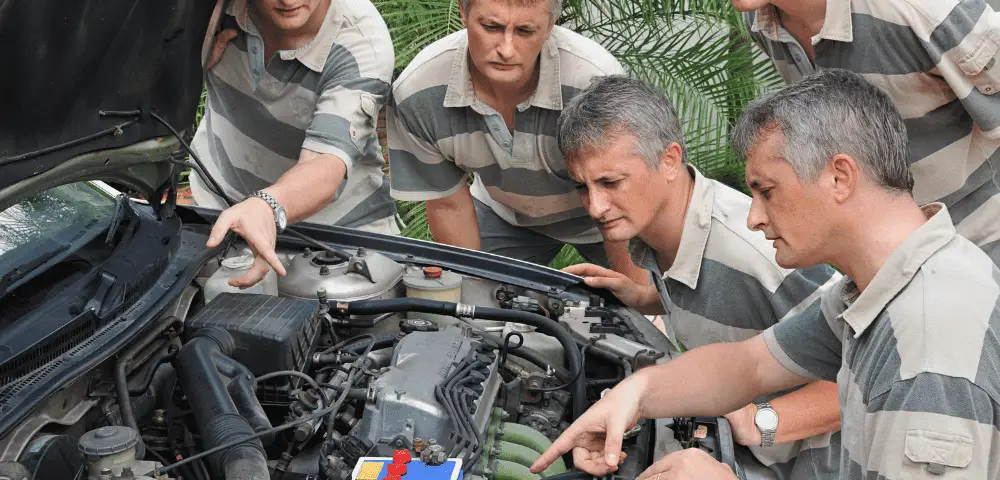For an experienced driver, one rev of the engine is enough to recognize if something is wrong.
Typical sounds you may encounter with a potential blown-out engine are knocking, clicking during acceleration, and muffled, or high-pitched noises just to name a few.
This text takes a quick look at the sort of sounds an engine makes when it’s blown or damaged.
What are the main reasons behind those and what’s the best course of action when you hear those out-of-place car noises?
Let’s find out!
Common Out-of-Place Sounds from an Engine
Not all sounds you hear come from the engine.
Sometimes, the fault can be in the suspension, cooling system, or some kind of belt.
However, the following sounds are almost always an indicator of an engine-related issue.
1. Knocking
This is one of the most common noises any engine makes when something is wrong.
A knocking engine block can be an indicator of anything ranging from bad quality fuel to something as serious as a timing belt issue.
Here are some likely causes of an engine knock.
- Low oil pressure
- Valve lifter failure
- Poor quality fuel
- Emission issues
- Timing belt issues
- Connecting rod failure
There are a lot of other issues but the aforementioned ones are the most common.
Out of all the issues that create a loud knocking noise or sound in an engine, connecting rod failure is the most serious.
If the sound originates from the bottom of the engine, then it’s most likely a connecting rod issue and you need to rush to a mechanic.
If left unattended, connecting rod failure can lead to a total failure of your engine and can cost thousands of dollars in repair.
So, never take such sounds lightly and immediately get them checked to save both your money and your time.
2. Clicking During Acceleration and Half-Speed
Acceleration is one point where your engine is under the most stress and that can draw out some unusual sounds from your car.
A clicking or knocking sound, when you accelerate, indicates an issue with your piston or a leak in the oil pressure.
For smaller problems, the usual fix is to simply remove the spark plugs and put a small quantity of engine oil inside.
If the sound still persists, then you are in for a lot of trouble and be ready for costly repairs.
Another common reason behind cars with the same sound is the valvetrain.
Excessive clearance or anything defective in the valvetrain (springs or any other component) can put a lot of strain on the engine by stifling the fuel inflow.
Getting the valvetrain adjusted is a job for your mechanics. They’ll look for signs like rough cams or damaged lifter faces before proceeding with the correction process.
3. Continuous Muffled Sound
A continuous sound coming from an engine even if it’s muffled indicates a serious issue.
It usually means that your engine is under continuous stress and may need repairs quickly.
Generally, continuous muffled sounds indicate that something is wrong with the valves, the piston, or the cylinders.
It can either be too much clearance or excessive wear and tear because of low lubrication.
While a muffled sound is serious and shouldn’t be ignored, it’s only the case if your engine overheating and it continues when the engine is hot.
If you live in a cold area with temperatures regularly going below zero, it’s likely that you’ll sometimes hear that sound and it shows that you are probably using the wrong engine oil.
Book an appointment with your mechanics and consult them on what grade of oil to use for the best performance in the cold.
4. High-Pitched Pinging Sound
The most likely cause of a high pinging sound is improper fuel.
Generally, it’s related to the octane level and the purity of the air-fuel mixture.
This sound is not an indicator of a serious issue but will continue to annoy you until you get it fixed.
If you recently changed your fuel, go back to the previous one or get the fuel injection system checked if you’ve started facing the issue out of the blue.
5. Grinding During Acceleration
A grinding noise from your engine is never good.
If your car is making a sound like this while accelerating, it’s better to get it checked asap to ensure peak performance.
Generally, a gasket issue or grinding between the moving parts of the engine can be the likely cause of the sound in your engine.
It can either be due to low oil pressure or any wear or tear in the engine, which can be expensive to repair.
In most cases, the engine itself is not the only thing that can cause that loud grinding noise.
It can be a worn-out clutch plate or an issue in your transmission system.
Apart from that, a worn-out suspension system or a CV joint can also cause a grinding or knocking noise, which means that you have a long list of components to check.
Nevertheless, it’s essential that you get them to check quickly as it’ll make things even worse if you ignore it.
6. Clunking Noise at the Startup
Generally unusual sounds during the startup are not something you should be worried about.
However, a clunking very loud knocking noise at the startup shows that there is something wrong and should be addressed immediately.
Generally, the sound is an indicator of starter failure or a broken flexplate.
While starter failure is nothing to be worried about the transmission flexplate cost around $1500 or more to replace for any car.
7. A Hissing Noise from the Engine
Hissing is generally accompanied by steam coming out of the engine and that is an issue with your coolant system.
The cooling system is integral for your engine’s performance and running the car while it’s not at
100% would lead to several problems down the line starting from a blown head gasket.
If your engine is severely damaged due to overheating, you are looking at a severe repair bill as every component affected by coolant failure would need a significant amount of money to rectify.
8. Popping
A sizzling or popping sound from the engine indicates leakage in any pipe.
It can be the radiator, coolant, or the exhaust manifold and you should get that checked as soon as possible.
The popping sound from the engine is not too serious but it still needs to be checked as soon as possible.
Repair Costs: How Much Does It Cost to Repair a Faulty Engine?
Naturally, whenever we talk about engine components and their repair, we can be 100% sure that it’ll cost a lot.
The general rule of thumb is to get any issues in the engine repaired as soon as possible.
Smaller repairs can pile up with time and create havoc in your engine, which then needs more time and resources to repair.
In some cases, the engine might even be completely seized or damaged beyond repair, which means that you’ll have no option but to go for a replacement.
However, a new engine can be extremely expensive.
Especially if you are looking for an older car, getting your hands on the right model might even become more difficult.
One way to go around it is to select remanufactured engines.
They might not be the same as the one produced by the manufacturer but there are many shops out there that deliver excellent work and leave very little to be desired in terms of quality, durability, and performance.
There is one thing that you’ll never get with any remanufactured engine no matter how good the mechanics working on it are.
That is a warranty.
New engines are generally protected by the manufacturers, but remanufactured engines won’t ever have that.
Finally, another thing that increases the overall cost of engines is the labor required. In many cases, it can even exceed the cost of the parts themselves.
Assembling an engine is a time-consuming and intricate process with a lot of dependent tasks. Leave anything out and you’ll be back to square one.
Key Takeaways
Many things can go wrong in any engine with time and most of the time that issue will manifest itself in the form of an unusual or loud noise.
As a driver, your responsibility is to keep an eye on such changes and rectify small issues as soon as they happen.
Not doing so would result in further problems down the line and may even cause permanent damage to your engine.
Engine repair is a costly process, but ignoring essential issues would create a lot more issues which will naturally cost more to repair.
So, it’s better to visit your mechanic as soon as you feel something is wrong.


